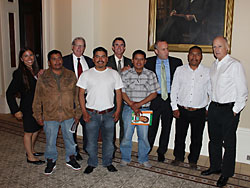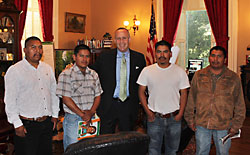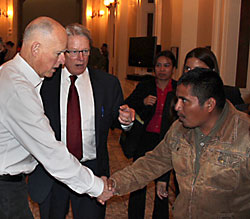From the fields to the State Capitol – Michael Marsh, Salinas Migrant Directing Attorney, writes about two important days in Sacramento where our staff and clients educated lawmakers and effected positive change.

In the photo from left to right are: Margie Estrada (legal aid to Senate President Pro Tem Darrell Steinberg), Juan Vasquez, Senator Bill Monning, Antonio Vasquez, Michael Marsh, Paulino Martinez, Senator Steinberg, Federico Vasquez, and Governor Jerry Brown.
CRLA effectively creates systemic change with a combination of legal experience and the very real, day-to-day experiences of our clients. The result is a partnership both informing the legislative and regulatory actions that CRLA urges, and monitoring the enforcement of any new legislative or regulatory action. A great example is SB666 currently moving forward in the California legislature.
CRLA received a written request for information and assistance from Senate President Pro Tem, Darrell Steinberg. Sen. Steinberg wanted to protect immigrant workers from threats of retaliation, specifically reporting an employee to immigration authorities for exercising his or her rights under labor laws.
On April 24, 2013, the California State Senate Committee on Labor and Industrial Relations passed SB666 unanimously. Three Democrats and two Republicans voted for the bill that would: 1) prohibit employers from reporting or threatening to report workers or their family members to immigration authorities because the workers exercised their employment rights; 2) subject employers who make such reports to potential fines and loss of their business licenses; 3) broaden the protections under certain Labor Code provisions, specifically sections 98.6 and 1102; 4) subject attorneys who report parties or witnesses in lawsuits to immigration authorities to sanctions; and 5) declare that unless a labor code statute specifically states that administrative exhaustion is required, no exhaustion is required.

Frederico Vasquez, Paulino Martinez, Antonio Vasquez and Juan Vasquez meet with Senate President Pro Tem Darrell Steinberg before their testimony in front of the Senate Judiciary Committee.
The four clients, all active participants in CRLA's indigenous leadership program, accompanied me to the hearing. Antonio Vasquez, one of the four clients, delivered a thoughtful, heartfelt speech to the committee on behalf of the workers! He began in Triqui (an indigenous Mexican language), surprising the attendees who expected to hear Spanish – fortunately interpreters on hand were forewarned. He then reintroduced himself in Spanish, and spoke about how many workers know that their rights are being violated, but don't complain for fear of retaliation. The other clients introduced themselves and offered their support for the bill as a step in the right direction to prevent the abuse of farmworkers and other low wage workers. Juan Vasquez and Federico Vasquez were both interviewed by Univision during the hearing as well. I gave examples of retaliation against farmworkers, the chilling effect it had over the industry/workplace, and how the playing field needed leveling so honest employers are not disadvantaged.

Former Salinas CRLA Directing Attorney, Senator Bill Monning, introduces Governor Jerry Brown to Juan Vasquez.
The group fielded several questions about the bill, but most interestingly, Republican Mark Wyland asked several questions about the Triqui people and language. He indicated that he understood the problem of retaliation against workers, which permitted some companies to ignore certain rights and laws, and thereby undercut law-abiding businesses. Afterward, he approached the group in the hallway and continued to speak about the role of law both domestically and internationally.
Only the California Chamber of Commerce significantly opposed the bill. Their oral arguments focused on one point—their belief that the bill would subject employers to claims of retaliation simply for requesting and reviewing I-9 information from an employee within 72 hours of employment as required by federal law. Senator Steinberg offered to work with the Chamber to address this concern.
Seven days later the group returned for one more amazing day in the state Capitol. Indigenous Leadership Program members Juan Vasquez, Antonio Vasquez, Paulino Martinez and Federico Vasquez accompanied me to testify at a Senate Judiciary Committee hearing on SB666. They did another fantastic job. The committee passed the bill 7 to 1, with two Republicans voting in favor, andthe California Chamber of Commerce dropped its opposition to the bill.
On the long drive back to Salinas, our clients mentioned two highlights. The first was getting to meet Governor Jerry Brown. But equally important was that Senator Monning thanked them for their efforts in Spanish during the hearing. At first, they appeared shocked that he was speaking Spanish during the hearing. Then when he thanked them for harvesting the food we eat and for sacrificing and taking risks to make it to the Capitol to testify on the bill, they were humbled. Several times on the way home they commented on how reaffirming it was to hear Monning's kind words in Spanish...and how they couldn't wait to tell their wives and kids.
When I learned from Senate staffers that SB666 passed out of the committee with bipartisan support, the staffers stressed that the strength of our farmworker clients' statements truly made the difference. Speaking truth to power, and in the end creating systemic change!
Read a news story about the bill being introduced:
http://www.mercurynews.com/california-budget/ci_23140773/steinberg-intro...


